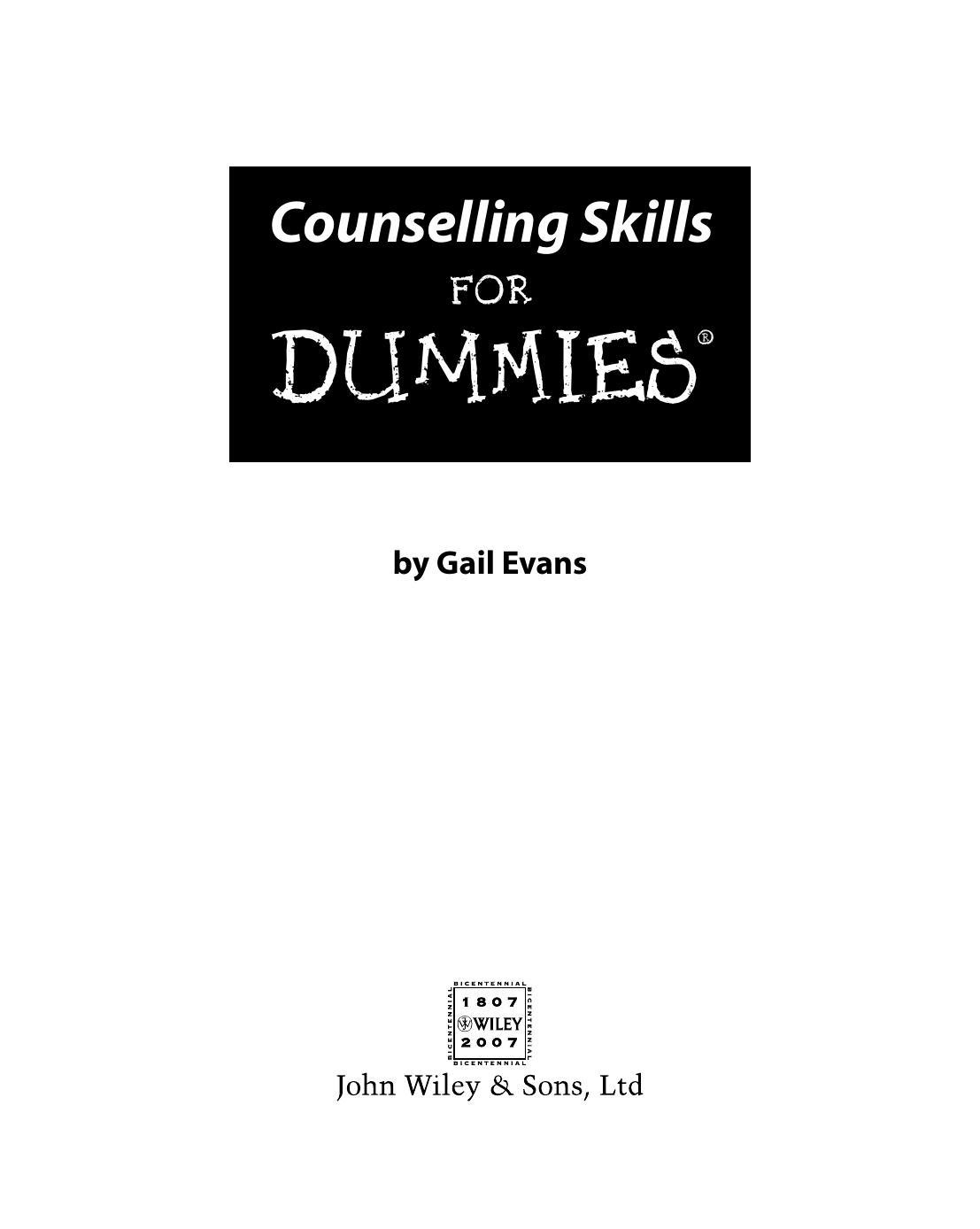Counselling Skills For Dummies by Gail Evans

Author:Gail Evans
Language: eng
Format: epub, pdf
Publisher: Wiley
Published: 2013-07-18T16:00:00+00:00
Chapter 10
Stage Two: Deepening Understanding
In This Chapter
Getting a deeper understanding
Achieving deeper empathy
Using more challenging skills
After you’ve established a relationship with the help-seeker and enabled her to begin telling her story, you move into the second stage of the helping conversation – also referred to as the middle or understanding stage. (Chapter 8 covers the first stage, about how to foster a good start; and Chapter 9 shows you how to build on that with Stage One skills). In Stage Two, which I talk about in this chapter, you help the speaker to deepen exploration in order to help her reach a fuller understanding of herself and the issue that she’s bringing to you. After the help-seeker arrives at this understanding, you move on to the Stage Three skills of decision-making, including choosing priorities and identifying goals, which I discuss in Chapter 11.
Often beneath the issue that the help-seeker first presents with are core concerns or deeper anxieties yet to be revealed. When the relationship is established, with a measure of trust, the help-seeker can, with your assistance, take more risks to uncover the complexity of the problem, using the middle stage’s more challenging skills. Because the skills of the understanding stage pose more of a threat to the help-seeker’s view of the problem and her world, you need to tread with care to convey acceptance and empathy effectively, so you need to minimise the risk of her feeling judged. This continuing foundation of respect and rapport, established through Stage One skills and attitudes, encourages the help-seeker to reveal feelings, self-perceptions, and behaviours that are usually private. The speaker runs the risk of feeling shame, embarrassment, and inadequacy and is likely to defend herself with her habitual defence mechanisms (refer to Chapter 7 for more on defence mechanisms).
If you achieve satisfaction from feeling superior, being competitive, or acting like an expert or a bully you have plenty of scope here. These traits aren’t just confined to other people who you can dismiss as nasty but are often a disliked and/or disowned part of oneself (refer to Chapter 2 for more about personal growth). Challenging skills bring a responsibility to be self-monitoring, self-aware, and alert to reactions in the help-seeker.
Getting Below the Surface
Stage Two (Understanding) of the helping relationship utilises all the qualities and skills of Stage One. Added are other, more challenging, skills to help you and the help-seeker get below the presenting issues. These skills are listed in Table 10-1 and then described in more detail later.
Because the middle stage is the most substantive part, you may be tempted to think of it as more important than the beginning or the end. The middle can only be a productive stage of understanding if it’s wrapped in a solid relationship involving all three stages – establishing the relationship and beginning exploration in Stage One; deepening exploration and understanding in Stage Two; and moving towards action and closure in Stage Three. If the speaker feels accepted, through
Download
This site does not store any files on its server. We only index and link to content provided by other sites. Please contact the content providers to delete copyright contents if any and email us, we'll remove relevant links or contents immediately.
| Elections & Political Process | Ideologies & Doctrines |
| International & World Politics | Political Science |
| Public Affairs & Policy | Specific Topics |
| United States |
The Secret History by Donna Tartt(16710)
The Social Justice Warrior Handbook by Lisa De Pasquale(11503)
Thirteen Reasons Why by Jay Asher(7827)
This Is How You Lose Her by Junot Diaz(5821)
Weapons of Math Destruction by Cathy O'Neil(5070)
Zero to One by Peter Thiel(4861)
The Myth of the Strong Leader by Archie Brown(4806)
Promise Me, Dad by Joe Biden(4473)
Beartown by Fredrik Backman(4460)
How Democracies Die by Steven Levitsky & Daniel Ziblatt(4440)
Stone's Rules by Roger Stone(4434)
The Fire Next Time by James Baldwin(4366)
100 Deadly Skills by Clint Emerson(4103)
A Higher Loyalty: Truth, Lies, and Leadership by James Comey(4053)
Rise and Kill First by Ronen Bergman(4039)
The David Icke Guide to the Global Conspiracy (and how to end it) by David Icke(3908)
The Farm by Tom Rob Smith(3890)
Secrecy World by Jake Bernstein(3801)
The Doomsday Machine by Daniel Ellsberg(3750)
